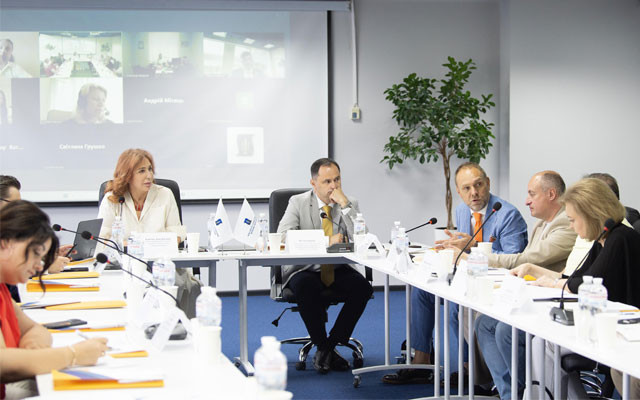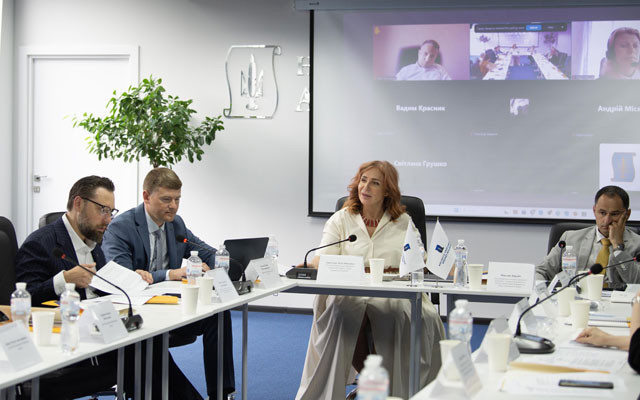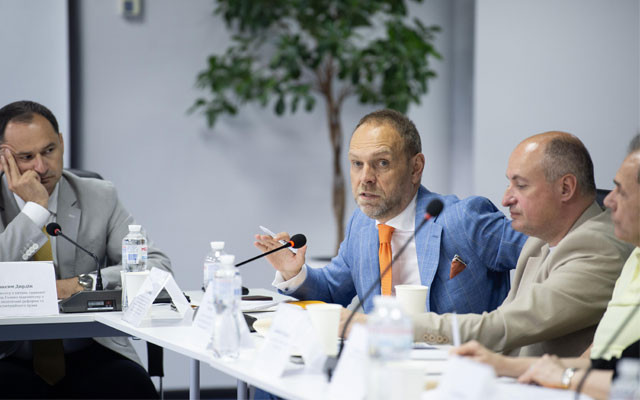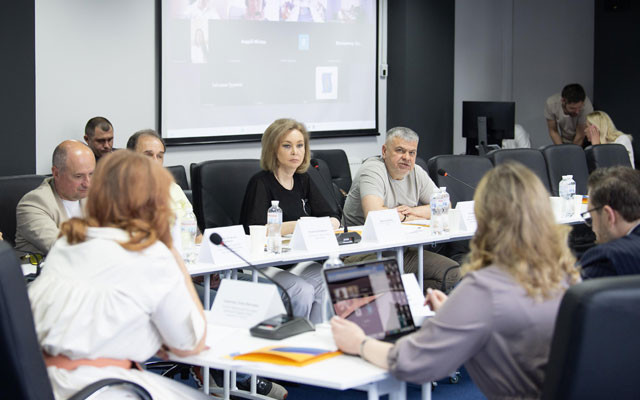
Strengthening the country's sovereignty requires a new model for forming the HQCJ – round table




The model of the competition commission for selecting members of the High Qualification Commission of Judges, introduced as an anti-crisis measure, has exhausted itself. The inaction of the HCJ in forming a new composition of the CC, the lack of accountability, and the existing signs of political influence indicate that powers should be transferred directly to the entities responsible for forming the HQCJ as defined by law.
The Ukrainian National Bar Association held a round table on «Problematic issues in the formation of the competition commission for the selection of members of the High Qualification Commission of Judges: challenges or obstruction?». The Association is the organizer of the event, and its highest representative body between congresses is the Bar Council of Ukraine, which, according to the law, is one of the entities responsible for forming the competition commission for the selection of members of the High Qualification Commission of Judges.
All entities involved in the formation of the competition commission, as provided by law, were invited to participate in the discussion. However, apart from the advocacy community, the Presidium of the National academy of legal sciences of Ukraine was represented by its Oleksandr Bandurka, First vice president, members of the Verkhovna Rada, members of the relevant committees of the Verkhovna Rada, the Temporary investigation commission on the investigation of possible corruption in law enforcement and justice, as well as scientists also joined the discussion.
Lidiya Izovitova, the President of the UNBA, BCU, reminded the participants that the first composition of the competition commission, which operated with the participation of international experts, had completed its powers on June 1, 2025. And in accordance with article 95-1 of the law «On the Judicial System and Status of Judges», the HQC had to publish a notice in «Voice of Ukraine» and on its website within five days, as well as send a written request to the relevant bodies (the Council of Judges of Ukraine, the Council of Prosecutors of Ukraine, the Bar Association of Ukraine, and the Presidium of the National academy of legal sciences of Ukraine) to submit candidates. However this was not done.
The BCU, which did not receive a notification from the HQC within the time limit specified by law, requested the HQC to explain the reasons for the delay. It is known that on June 17, the HQC was supposed to consider the issue of forming the CC at its meeting. At least it was in the draft agenda, but it did not make it to the final agenda and was therefore not considered. Instead, the UNBA received a letter signed by the deputy chair of the HQC, which referred to the discussion of possible selection methods or criteria, although this is not provided for by law.
Petro Boiko, the chairman of the Kyiv regional bar council, described the HQC's behavior as a deliberate evasion of the law. «The HQC is not complying with the law, and it is doing so deliberately. This violation is obvious», - he emphasized. At the same time, the chairman of the RBC called the HQC’s response regarding the development of methodological recommendations for the selection of candidates manipulative: «The only pleasant thing is that they are still ashamed. And they are covering up their shameful actions with a fig leaf: «Let's develop guidelines».
L. Izovitova also drew attention to the appearance on 18 June of draft law No. 13382 on improving the procedure for the competition for the position of member of the High Council of Justice, which provides for the resumption of the work of the previous competition commission.
National security issues
Rostislav Kravets, the chairman of the Professional union «Ukrainian independent foundation of lawyers», criticized the inaction of the High Council of Justice, which failed to take the steps required by law to form a new composition of the competition commission. He addressed all entities involved in the formation of the CC and was one of the initiators of the round table.
«There are no grounds for postponement, except that the High Council of Justice decided to violate the law and agree to the proposal of one of its members to wait. It is unclear what we are waiting for», - said the advocate.
In his opinion, this is not only a violation of deadlines, but also a threat to national security due to attempts to extend the participation of international experts in the selection of members of the High Council of Justice, despite the expiration of the powers of the previous composition of the competition commission. «There is a terrible and threatening issue for national security regarding the influence of foreigners on the formation of state authorities in Ukraine», - he explained.
R. Kravets also called on parliament to pay attention to the situation and consider dismissing members of the High Council of Justice who are ignoring the law. In his opinion, the advocacy community should propose its own initiative for a legislative mechanism to respond to such inaction.
Call a spade a spade
Serhiy Vlasenko, a member of the Verkhovna Rada Committee on legal policy, called the actions of the High Council of Justice an act of sabotage.
«I personally believe that this is called, in good Ukrainian, the word «sabotage». There is no other way to describe it. And those people who are currently blocking the creation of a competition commission in order to select a new member of the High Council of Justice are committing sabotage», - the parliamentarian said.
The parliamentarian noted that the High Council of Justice itself already has a shortage of members. The commission has repeatedly appealed to parliament to simplify the competition procedures due to overload. «On the one hand, they do not have time to do this, and on the other hand, someone is deliberately blocking the appointment of another member of the High Council of Justice», - he explained.
The MP paid particular attention to the role of international experts in the competition commission. He recalled that the Venice commission, in its conclusions, emphasized that the use of international experts is an exceptional measure that should be short-term and one-off. It was from this position, according to him, that the Verkhovna Rada proceeded in 2021 when it resumed the work of the HQC and determined a new model for the formation of the CC.
Maksym Dyrdin, one of the authors of the draft law on the restoration of the HQCJ, member of the Verkhovna Rada Committee on legal policy, permanent representative of the Verkhovna Rada of Ukraine to the Constitutional Court drew attention to the gap between the intentions of parliament and the subsequent application of the law. «This is a separate situation, in my opinion, when the legislator has one understanding — what he adopts, what is discussed in committees among colleagues, and how it is voted on — and then at the implementation level, it turns into a completely different story», - he said. This distorted approach to the implementation of the law, according to the deputy, is also an important factor that cannot be ignored.
Responsibility for blocking
Igor Fomin, a representative of the UNBA Committee on human rights, who was a member of the High Council of Justice for some time, described the situation as the result of deliberate actions rather than accidental negligence. «This is not because of a certain negligence on the part of the members of the High Council of Justice, but because of a desire to block the law. And we see this consistently», - he said.
In his opinion, a formal pretext for delaying the procedure is being used to introduce a model in which control over the formation of the judiciary is effectively transferred to external groups of influence. «This is not a question of electing a judge to administer justice. This is a question of creating a certain branch of government that would be able to control these actions, - I. Fomin said. He stressed that advocacy, as a component of justice, must participate in the formation of the High Council of Justice through its representatives. «No one has the right to block these actions. I am deeply convinced of this», - he stressed.
Grigory Mamka, deputy chairman of the Verkhovna Rada Committee on law enforcement, member of the Temporary Investigation Commission drew attention to the broader context — the need for legislative regulation of the responsibility of members of competition commissions and the introduction of clear terms for the exercise of powers. He also criticized the practice of involving international experts in the selection of officials, pointing to the questionable effectiveness of such decisions. In his opinion, the state should ensure a mechanism for monitoring and responding to cases of obstruction of the work of bodies, in particular by appealing to law enforcement agencies and establishing responsibility for inaction.
Doubts about unconstitutionality
The legal assessment of draft law No. 13382 was provided by Maria Chernukha, the deputy chairman of the UNBA Committee on legislative initiatives on advocacy. She drew attention to the fact that the draft law contradicts the Constitution and the basic provisions of the current law, which does not provide for the possibility of extending the powers of the previous competition commission. According to her, as of June 1, 2025, this commission will no longer have legal status and will not be able to take any action. «The point is that the competition commission, which has now ceased to exist, will continue its activities and extend its mandate. But it has already finished its work. That's it. These are unrealistic things», - the advocate said. In her opinion, such an attempt is a violation of Article 8 of the Constitution of Ukraine, which enshrines the principle of the rule of law.
Moreover, the bill itself appeared after the commission had already completed its work, so it cannot even be considered within the time limits.
According to S. Vlasenko, the competitive model that has been in place in Ukraine for the past eight years has completely discredited itself. He noted that the attempt to introduce such a mechanism did not live up to expectations: «International experts who have been working in these commissions since 2017 have also completely discredited themselves. We have not seen any breakthroughs in the bodies where they pretend to help».
He called for acknowledging mistakes and moving forward. «And we must admit it. And we must admit that this is so. The Verkhovna Rada tried to do this, tried this path. This path is wrong. It must be stopped», - the MP said. Moreover, the politician believes that the competition model not only failed to ensure high-quality selection, but also replaced the will of state bodies: «The system replaced constitutional bodies with some advisory groups, whose decisions are binding on constitutional bodies».
S. Vlasenko also reported that he had submitted a petition to the Constitutional Court regarding the unconstitutionality of the institution of international experts. The case is currently blocked due to the recusal of judges, who were also selected by international experts and saw a conflict of interest in this. «The reporting judge recused himself, and four other judges also recused themselves. Of the eleven, six remain. Now there are seven, but that is not enough for a quorum». As the deputy noted, a similar situation may arise in the future.
«I believe that competitions in their current form should be stopped», - concluded S. Vlasenko.
Trend toward curtailing competitions
But doubts about the effectiveness of the competitive model for selecting personnel are not limited to the example of the HQCJ. Recently, the Cabinet of Ministers refused to appoint the winner of an open competition for the position of director of the Economic security bureau, despite the fact that the candidate had been selected by the competition commission. And the newly appointed Prosecutor General canceled the personnel reserve of the prosecutor's office, formed as a result of a competitive selection process with the participation of international experts, even though the selection was almost complete.
Both decisions have become symbolic examples of disappointment in the competitive procedure, which was presented as a standard of transparency and integrity. This is not just a symptom of fatigue with the existing procedures — perhaps this is why representatives of the High Council of Justice, the Council of Judges of Ukraine, and the Council of Prosecutors of Ukraine, understanding the obviousness of the problem, refused to participate in its discussion.
This may be a sign of a systemic crisis of confidence in the very idea of selection through competitions, which until recently was presented as the only option. It is worth recalling that the current composition of the High Council of Justice was also selected by international experts. Therefore, there is a certain conflict of interest when it comes to deciding on a matter of principle.
And this issue will inevitably arise, as the commission is required to provide parliament with its opinion on draft law No. 13382, which concerns the judicial system and the status of judges. This conflict of interest is a potential subject for investigation by the Verkhovna Rada's Temporary Investigation Commission on possible corruption in law enforcement and the judiciary.
If the body that appoints members of the High Qualification Commission of Judges is not changed, this conflict will recur again and again.
In this context, a number of participants expressed the idea of abolishing the competition commission for the selection of members of the High Qualification Commission of Judges (as a direction for improving legislation) and transferring powers directly to the entities responsible for formation, which appears to be a potential new direction for reform. This is a real attempt to return to a natural, sovereign model of selection.
As announced during the discussion, the National Bar Association of Ukraine will prepare a draft law and provide all necessary materials to the parliamentary committees on legal policy and law enforcement for further study and submission as a legislative initiative in accordance with the procedure established by the Regulations of the Verkhovna Rada.
© 2025 Unba.org.ua Всі права захищені
"Національна Асоціація Адвокатів України". Передрук та інше використання матеріалів, що розміщені на даному веб-сайті дозволяється за умови посилання на джерело. Інтернет-видання та засоби масової інформації можуть використовувати матеріали сайту, розміщувати відео з офіційного веб-сайту Національної Асоціації Адвокатів України на власних веб-сторінках, за умови гіперпосилання на офіційний веб-сайт Національної Асоціації Адвокатів України. Заборонено передрук та використання матеріалів, у яких міститься посилання на інші інтернет-видання та засоби масової інформації. Матеріали позначені міткою "Реклама", публікуються на правах реклами.